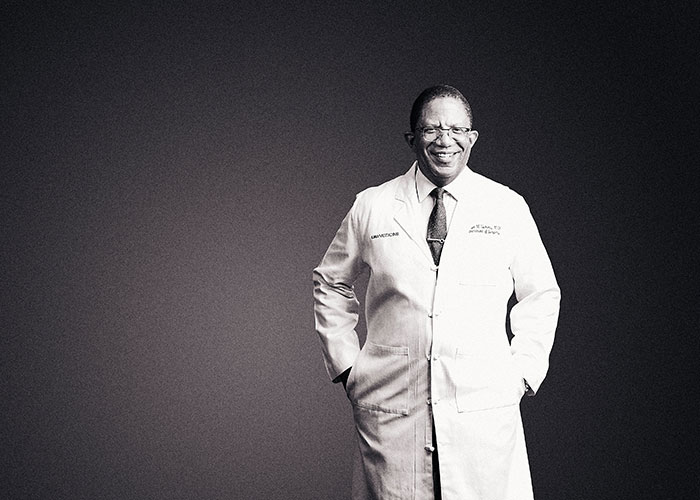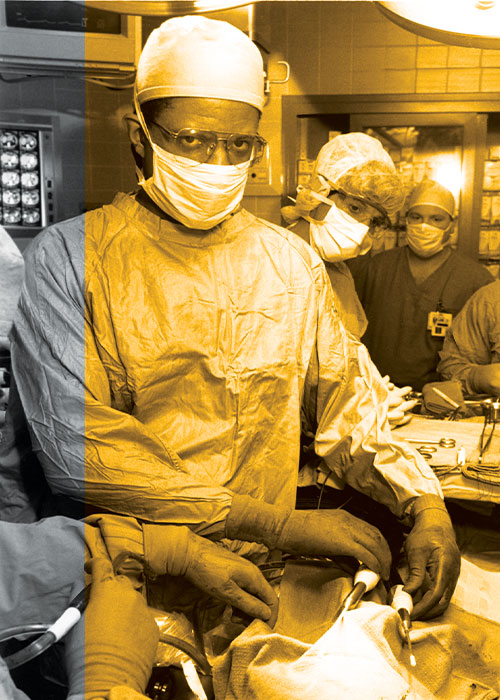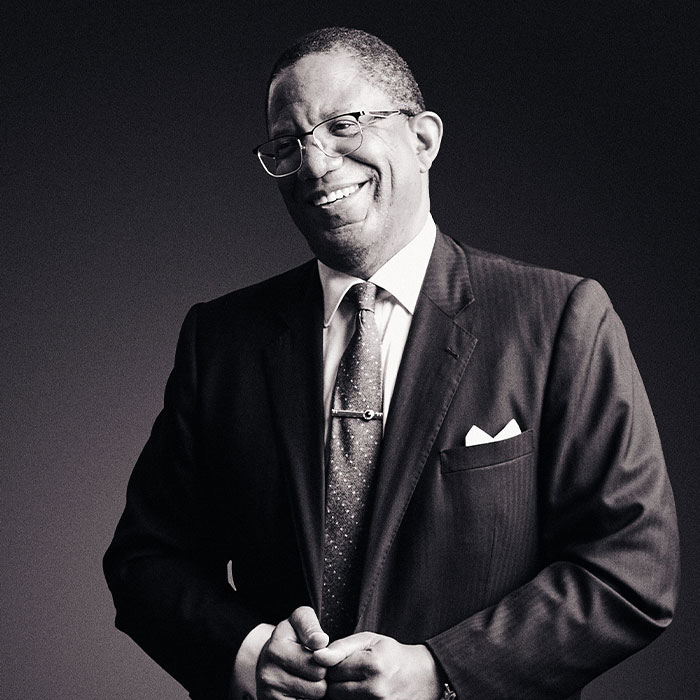The turn of the New Year brought an exciting leadership transition to UAB, as UAB Heersink School of Medicine Dean Selwyn Vickers, M.D., FACS, assumed the role of CEO of the UAB Health System and CEO of the UAB/Ascension St. Vincent’s Alliance, while retaining his role as dean.
January 1, 2022, was the official date the transition took place, but the shift to a dual-role, CEO/dean leadership model had been carefully researched and planned. In fact, according to Vickers, it was the culmination of a shift toward greater alignment between the Heersink School of Medicine, the UAB Health System, and the University of Alabama Health Services Foundation (HSF) physicians’ practice plan begun under former School of Medicine dean and current UAB President Ray Watts, M.D. “When he was dean, Ray had the prior experience of being president of the HSF and interim CEO of the Health System. He had a conviction that the walls between those entities should come down, and he began the process of breaking down those barriers.”  Vickers is the first person to be the medical school dean as well as the CEO of the UAB Health System and the CEO of the UAB/Ascension St. Vincent's Alliance.
Vickers is the first person to be the medical school dean as well as the CEO of the UAB Health System and the CEO of the UAB/Ascension St. Vincent's Alliance.
When former UAB Health System CEO Will Ferniany, Ph.D., decided he wanted to retire at the end of 2021 after nearly 13 years at the helm, he began meeting with Vickers, Watts, and other leaders to plot out the best way to ensure a smooth and effective transition. Through these talks, the plan to transform the leadership model to a single leader at the top began to take shape.
According to Vickers, the impetus for the change boils down to two words: alignment and excellence. “The structural change of our clinical enterprise’s leadership from two roles to one stems from the tremendous growth we have experienced over the past decade, thanks in large part to Dr. Ferniany’s strong leadership,” he says. “A key facet of my new role is identifying and fostering synergy between the lanes of academic research, patient care, and education and training. Ongoing alignment is achieved through our ability to create excellence in our individual lanes and uniting them for the shared goal of quality patient care.”
The CEO/dean leadership model is one that has been implemented successfully at a number of peer academic medical centers (AMCs) across the country, whose leaders Vickers consulted in planning for UAB’s transition. “The CEO/dean model is an operationalized strategy that has been successful for every AMC that has instituted it,” he says. “I met with leaders at Vanderbilt University, University of North Carolina School of Medicine, Johns Hopkins Medicine, and University of Michigan Medical School to hear and understand how their structures work.”
Those talks confirmed for Vickers and senior leaders that consolidating the roles of Health System CEO and Heersink School of Medicine dean to one person made sense for UAB. “A singular leader can fuse the interests of all groups at our enterprise and take a thoughtful approach to finances, operations, and outcomes of both worlds,” Vickers says. “My personal goal is to be a relational leader for every employee, faculty member, and trainee.”
A Leader’s Journey
Vickers’ unique combination of personal insight and earned expertise makes him ideally suited to tackle both the dean and CEO roles. At various points along his career path, he has been a medical student, resident and chief resident, practicing surgeon, researcher, and department chair, among others, giving him firsthand knowledge of the challenges confronting each group.
The many influences that guided him toward medicine start with his family. His parents, John and Clara Vickers, not only earned college degrees—a rarity for African-Americans living in Jim Crow-era Alabama—but they also both earned master’s degrees in education fields. His father went on to become one of the first 15 African-Americans to earn a doctoral degree from the University of Alabama. He later became dean of the School of Education at Alabama A&M University in Huntsville, where Vickers spent most of his formative years.
Vickers’ parents’ inherited their reverence for learning from their forebears. His paternal grandfather taught himself to read and write at age 44 and became mayor of his town. His maternal grandmother went to college for 10 summers to earn her bachelor’s degree and worked as a school principal in the 1940s. Her father studied under famed educator Booker T. Washington.
1986 M.D., John Hopkins University School of Medicine • 1986-1988 Surgical Internship, Johns Hopkins University • 1988-1990 Surgical Research Fellowship, Johns Hopkins University • 1990-1991 Registrar Surgery, John Radcliffe Hospital, Oxford, England • 1991-1993 Surgical Residency, Chief Residency, Johns Hopkins University • 1993-1994 Surgical Oncology Fellowship, Johns Hopkins University • 1993-1994 Instructor in Surgery, Assistant Chief of Service/Fellowship - Surgical Oncology, Johns Hopkins University • 1994-1999 Assistant Professor, UAB Department of Surgery • 1999-2003 Associate Professor, UAB Department of Surgery • 2000-2006 Chief, Section of GI Surgery, UAB Department of Surgery • 2001-2006 John H. Blue Chair of General Surgery, UAB Department of Surgery • 2002-2006 Co-Director, UAB Minority Health & Health Disparities Research Center • 2003-2006 Professor, UAB Department of Surgery • 2003-2006 Senior Scientist, O’Neal Comprehensive Cancer Center at UAB • 2006-2013 Jay Phillips Professor and Chair, University of Minnesota Department of Surgery • 2013-2021 Senior Vice President for Medicine and Dean, UAB Heersink School of Medicine • 2022 UAB Heersink School of Medicine, CEO, UAB Health System, and CEO, UAB/Ascension St. Vincent’s Alliance
The summer Vickers was 15, he visited his uncle, Leroy Vickers, M.D., in Cincinnati and shadowed him at his internal medicine practice for a week. “I still remember the elderly man with aortic stenosis he took me to see in the hospital,” Vickers says. “My uncle had seen him in his clinic and heard that very distinctive murmur. He got him into the hospital and got his valve replaced. The man was still recovering when we went by to see him, but he was so thankful because his quality of life was restored. I saw that man’s face when he saw my uncle, who was probably only 29 or 30 at the time, and I knew then that’s what I wanted to do.” Vickers performing surgery during his first tenure on the UAB surgical faculty, 1994-2006. Photo courtesy of UAB Archives.
Vickers performing surgery during his first tenure on the UAB surgical faculty, 1994-2006. Photo courtesy of UAB Archives.
Vickers attended Johns Hopkins for undergraduate, medical school, and postdoctoral training, during which time he honed in on his two abiding clinical and research passions: pancreatic cancer and health disparities.
He returned to Alabama in 1994 to join the UAB Department of Surgery as an assistant professor. He eventually rose to professor of surgery and became the first holder of the John H. Blue Chair of General Surgery, as well as the co-director of the UAB Minority Health and Health Disparities Research Center. In 2006, he was recruited to the University of Minnesota to become the Jay Phillips Professor and Chair of its Department of Surgery. In 2013, he was recruited back to UAB, this time to lead the School of Medicine as dean.
Vickers continues to perform pancreatic cancer surgeries, and his research has led to the development of important cancer treatments as well as crucial advances in the understanding of health disparities. He is a member of the prestigious National Academy of Medicine and is currently president of the American Surgical Association, the nation’s oldest and most prominent surgical organization. He continues to see patients and has had continuous National Institutes of Health (NIH) funding for more than 25 years. Even with these successes, he says the foundations of his life have always been “faith, family, and friends.”
All of these experiences, Vickers says, will inform his leadership style. “My personal growth goal is to be a relational leader for every employee, faculty member, and trainee,” he says.
The Dream Team
Famed longtime GE CEO Jack Welch said, “Before you are a leader, success is all about growing yourself. When you become a leader, success is all about growing others.” Vickers readily admits he will depend on a trusted, seasoned team of senior leaders to help him manage two highly demanding roles.
“I recognize that I cannot be everywhere all the time and I cannot be everything to everybody,” Vickers says. “Managing these roles will be largely driven by my reliance on the people serving in top leadership positions across the school and the UAB Health System. I want to position people so that the full scope of our academic mission can be front and center for all of our leadership.”
In the Heersink School of Medicine, Vickers says Executive Vice Dean Anupam Agarwal, M.D., will play a central role as “an important leader and figure for department chairs and faculty. Not only is he an accomplished scientist, but he is also accomplished in academic strategy. He has built great trust and confidence from people around him that will continue to serve us well.”
10 Questions with Dr. Vickers
Book you’re currently reading: The Speed of Trust by Stephen Covey
Favorite book: The Warmth of Other Suns by Isabel Wilkerson
Favorite local restaurant: Hot and Hot Fish Club
Favorite kind of pizza: Margherita
Favorite place you’ve visited: Cape Town, South Africa
Place you want to visit: Maldives
Favorite singer: Bill Withers
First concert: George Clinton and Parliament Funkadelic
Personal motto: Veritas vos liberabit (“The truth will set you free,” the Johns Hopkins University motto)
What makes you optimistic about the future?: I think we’ve overcome a lot more than we face now, both as a country and as a city, so I believe we have a very bright future ahead.
In the research realm, Senior Vice Dean for Research Etty (Tika) Benveniste, Ph.D., “will continue to lead with integrity and honor, as she has for several decades.” He especially credits her efforts around space and facilities, recruitment, and new research initiatives for helping grow the school’s research enterprise.
On the UAB Health System side, Dawn Bulgarella assumed a new position as president of the UAB Health System on January 1, in addition to the role of chief financial officer (CFO) that she has held since 2014. She is also the CFO for the UAB/Ascension St. Vincent’s Alliance and is responsible for combined annual budgets in excess of $5 billion.
“Our size and scope are major drivers to why we need both a president and a CEO in the Health System,” Bulgarella says. “As CEO, Dr. Vickers is going to be more outward-facing and involved in strategic direction setting, while I as president will maintain day-to-day responsibilities and partner with him and other senior leaders.”
Reid Jones became CEO of UAB Medicine in June 2020 after having served as chief operating officer of the UAB Health System since the position was created in 2013. “Reid has been a steady hand helping steer the Health System through many challenges and achievements during his long tenure,” Vickers says. “He has a deep understanding of the organization and his experience and expertise are key assets.”
Tony Jones, M.D., senior associate dean for Clinical Affairs in the Heersink School of Medicine, chief physician executive in the UAB Health System, and HSF president, is charged with maximizing practice efficiency and productivity, further improving quality and patient safety by promoting integration of the clinical service lines, and developing innovative, value-added care models. According to Vickers, “Tony is an accomplished academic physician executive who has extensive leadership expertise and the broad confidence and support of his physician peers.”
Vickers also says Jason Alexander, CEO of Ascension St. Vincent’s, will be a critical partner. “The St. Vincent’s Alliance has the potential to be transformative,” Vickers says. “We don’t have space to expand UAB’s footprint here in Birmingham. In order to continue growing the scope of our mission—from expanding access to care for our patients, to educating trainees, to growing our research—we need this alliance. So I am very excited by the synergies that exist between UAB and St. Vincent’s that benefit both our institutions.”
Vickers says he is particularly proud of the diversity of the senior leadership team. “I think we arguably have one of the most diverse teams in the country. It looks a more like the composition of our state, and it is a unique composition, I think, when you look across the country.”
The Path Forward
Alabamians have some of the most challenging health statistics anywhere in the United States: The state ranks 46th for obesity, 48th for diabetes, and 49th for high blood pressure. Among Vickers’ priorities as CEO is to continue building on and expanding the clinical excellence that he says Ferniany cultivated. “Because of Dr. Ferniany, the UAB Health System has transformed and grown,” Vickers says. “What excites me about the transition is the opportunity to create a truly national profile for our health system and our academic medical center. I want to see our institution gain the greatest level of national recognition for what it contributes, and to attract more exceptional people to come here.” Vickers says he is particularly proud of the diversity of the senior leadership team, and considers it one of the great strengths of UAB.
Vickers says he is particularly proud of the diversity of the senior leadership team, and considers it one of the great strengths of UAB.
In addition, Vickers says confronting socioeconomic barriers to health and health care is a key goal, and that strengthening UAB’s efforts to bring affordable health care to all people and regions of Alabama will be a hallmark of his leadership. “Alignment of key aspects of our mission will allow us to be our most effective and a potent force for affecting health care disparities, improving health outcomes, and relieving the burden of disease our patients face. The alignment we’ve been moving toward is really about a single focus: the health of our community. I want the clinical and research worlds to be oriented toward creating the best outcomes for our patients.”
As to what success looks like, Vickers says it’s about people. “I think success looks like we’re an organization that is concerned about every individual within it, from the environmental services staff to our busiest cardiac surgeon. I think it also looks like each part of our enterprise will continue to bring its best in education, research, and clinical care, and I see my job as bringing these teams closer together to work toward our ultimate mission of improving the health of all Alabamians and everyone who comes to us for care.” – By Jane Longshore and Mary Ashley Canevaro
